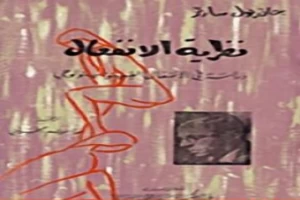Newly released
This book is new and will be uploaded as soon as it becomes available to us and if we secure the necessary publishing rights.

نظرية الانفعال
(0)
Author:
Jean Paul SartreNumber Of Reads:
128
Language:
Arabic
Category:
Social sciencesSection:
Pages:
116
Quality:
good
Views:
1321
Quate
Review
Save
Share
Book Description
Jean Paul Sartre
Jean-Paul Charles Emard Sartre (21 June 1905 Paris – 15 April 1980 Paris) was a French philosopher, novelist, playwright, screenwriter, literary critic and political activist. He started his working life as a teacher. He studied philosophy in Germany during World War II. When Nazi Germany occupied France, Sartre joined the underground French resistance. Sartre was known and famous for being a prolific writer and for his literary works and his philosophy called Existentialism, and secondly his political affiliation with the extreme left. Sartre was a constant companion of the philosopher and writer Simone de Beauvoir, whom her political enemies called the "Great Sartre." Although their philosophy is close, he does not like to confuse them. The two writers have influenced each other. Sartre's literary works are rich in themes and philosophical texts of unequal sizes such as Being and Nothingness (1943), the Existential Brief Humanism (1945) or the Critique of Dialectical Reason (1960) and also literary texts in the collection of short stories such as The Wall or his novels such as Nausea (1938) and the trilogy Freedom Roads (1945). Sartre also wrote in theater such as The Flies (1943), The Closed Room (1944), The Virtuous Whore (1946), The Devil and the Good God (1951) and The Prisoners of Altona (1959) and these works were a large part of his literary output. Late in his life, in 1964, Sartre published a book dealing with the first eleven years of his life entitled The Words, in addition to a large study on Gustave Flaubert in a book entitled The Fool of the Family (1971-1972). He has also published biographies of many writers such as Tintoretto, Mallarmé, Charles Baudelaire, and Jean Genet. Sartre has always refused to be honored because of his devotion to himself and his ideas, and it is worth noting that he refused to receive the Nobel Prize in Literature, but only accepted the title of Doctor honoris causa from the University of Jerusalem in 1976.
Book Currently Unavailable
This book is currently unavailable for publication. We obtained it under a Creative Commons license, but the author or publisher has not granted permission to publish it.
Rate Now
5 Stars
4 Stars
3 Stars
2 Stars
1 Stars
Quotes
Top Rated
Latest
Quate
Be the first to leave a quote and earn 10 points
instead of 3
Comments
Be the first to leave a comment and earn 5 points
instead of 3